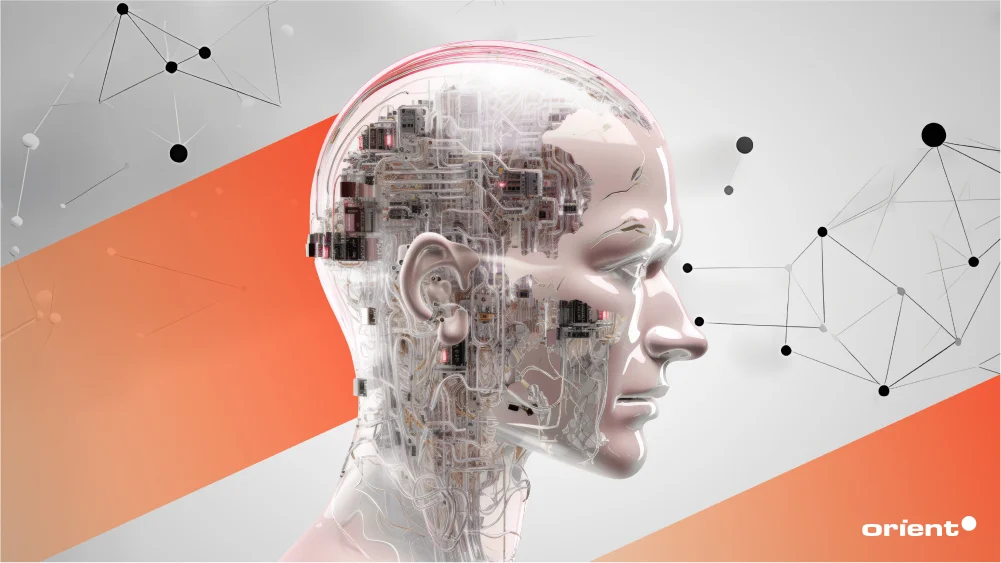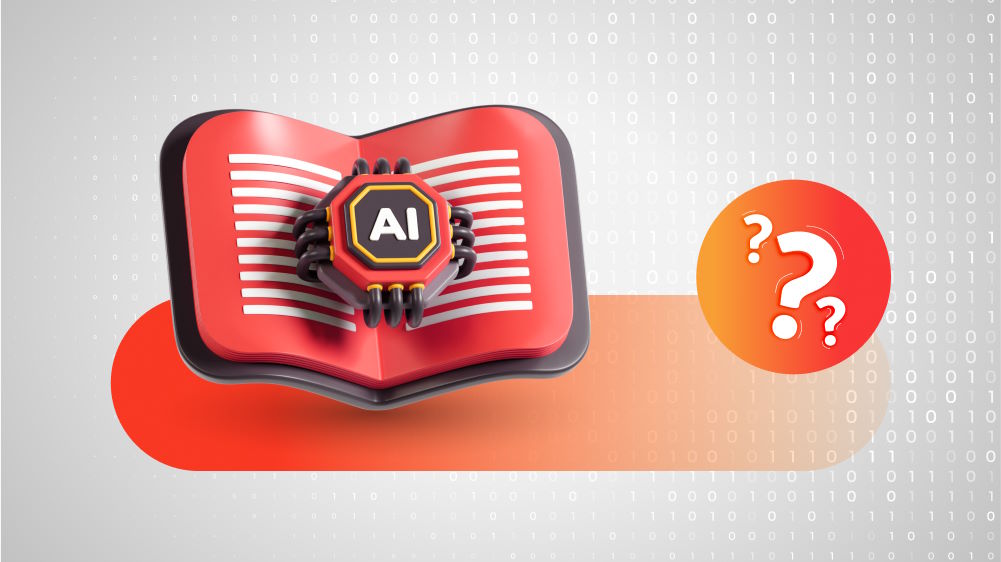What Is Quantum Computing AI, and Should You Incorporate It into Your Business?
Artificial intelligence (AI) and quantum computing could potentially reshape our world. But what is the current state of these technologies, and how can you feasibly incorporate them into your business? Read on to find out.

Content Map
More chaptersArtificial intelligence (AI), particularly generative AI, has become one of the most widely adopted technologies in recent times. The advent of tools like ChatGPT has made it easier than ever for businesses and individuals to solve complex problems in new, innovative ways.
However, as of this writing, AI models are limited by the classical computers’ capabilities, which perform problem-solving in a linear fashion. One way that businesses and individuals can harness the full potential of AI is to incorporate quantum computing into their processes.
In this article, you’ll learn about quantum computing AI. We’ll discuss what it is, how it works, its challenges and compatibility issues, and how to incorporate it into your business.
Key Takeaways:
- Quantum AI is a combination of quantum mechanics and artificial intelligence.
- Companies like Microsoft, Google, and Amazon offer quantum computing services to customers over the cloud.
- High hardware requirements, scalability issues, and reworking algorithms are some of the many challenges facing quantum AI.
What Is Quantum Computing AI?
Quantum computing AI is a field of computer science. It merges the principles of quantum mechanics with artificial intelligence. It is designed to solve problems faster and more accurately than traditional quantum computing, which is limited by the capabilities of classical computing.
Classical computers operate in binary, where bits are either 0 or 1. Quantum computers utilize quantum bits (qubits) that can exist in different states simultaneously as a superposition. This allows quantum computers to explore a wider range of solutions than classical computers.

AI-powered quantum computers use techniques like pattern recognition and deep learning to solve complex problems. They can collect, analyze, and process large volumes of data to recognize patterns and make predictions. And they can do so faster and more accurately than traditional quantum computers.
How Is Quantum AI Advancing and Impacting Industries?
While quantum AI may change how many industries are run, building and maintaining quantum hardware can be expensive.
To compensate for this, companies like Microsoft, Google, and Amazon are starting to offer quantum computing as a cloud service. Businesses and individuals can utilize these services on a pay-as-you-use monthly subscription model, which is more affordable and accessible than running your own infrastructure.
Here are some of the many ways that quantum AI can advance different industries.
Healthcare – Drug Discovery and Development
Pharmaceutical companies invest millions into the research and development of new and existing drugs. Traditionally, this process has been carried out with digital tools, such as density functional theory (DFT) and molecular dynamics (MD). However, in recent years, artificial intelligence and quantum computing have been at the forefront of pharmaceutical R&D.

By using quantum AI to identify disease and illness-curing molecules, researchers can predict how different molecular structures behave under different interactions. They can then discover new drugs and evaluate their efficacy.
Quantum computers can predict the behavior of drug molecules much faster than classical computers, which are limited by their reduced computing power and linear approach to problem-solving.
Finance – Financial Forecasting
Quantum AI has the potential to help finance companies perform financial forecasting faster and more accurately than classical computers.
In a study published by Cornell University, researchers explored the impact of quantum algorithms on machine learning for businesses across various applications. The study found that classical and quantum Determinantal Point Processes – a probability distribution used to model global negative correlations – improved the precision of churn predictions by 6%.

Elsewhere, quantum AI is redefining financial analysis, enabling the analysis of financial datasets with greater speed and precision. Quantic algorithms, such as the Quantum Approximate Optimization Algorithm (QAOA), can assess multiple factors simultaneously – economic factors, market trends – to identify new investment opportunities and maximize returns on existing investments.
Climate Research – Climate Modeling
Understanding how the Earth’s climate works is vital to identifying and mitigating the effects of climate change.
However, classical computers’ limitations make it hard to solve our biggest climate challenges. Traditional predictive models extrapolate data from past climate events to predict future outcomes. As a result, these predictions become approximations, which are prone to inaccurate forecasts.

Using quantum AI to simulate complex systems in climate models, researchers can simulate large-scale climate models faster and more accurately than classical computers.
This is further aided by AI’s pattern recognition capabilities, which allow researchers to analyze large climate datasets. From there, they can not only predict potential climate outcomes but also evaluate the interactions driving these environmental changes.
Challenges and Compatibility Issues with Quantum Computing and AI
Despite the advantages of quantum AI, there are many challenges and compatibility issues. The introduction of qubits and quantum processors can introduce problems that is not present on classical computers.
Below are some of the biggest challenges of combining quantum computing with AI.

Quantum Hardware Requirements
Quantum computing hardware is complicated to manufacture, making it expensive to purchase and maintain. So, only large corporations, government bodies, and research institutions have the resources to procure this type of hardware.
They also have the means to run quantum processors at the correct temperature, which can be as low as -200°C. Meeting these requirements involves investing in significant upfront and ongoing costs, including rent, utilities, and climate control.
However, scientists have recently built the smallest quantum computer in the world, which can work at room temperature and fit on a desk.
Scalability Issues
Upscaling a quantum computing system is a complicated process, as quantum control systems must scale linearly with the quantum processor’s size. Also, upscaling a quantum computer requires setting up hundreds or even thousands of qubits, which increases the risk of error rates and incoherence.
Some organizations or government bodies may want to run classical and quantum computing systems simultaneously. This hybrid setup can introduce compatibility issues with different data types.
Reworking ML and AI Algorithms
The latest ML and AI algorithms for quantum computing represent a range of new possibilities. They can potentially advance fields like search optimization, cryptography, and simulating quantum systems.
However, converting classical computing algorithms into quantum computing AI algorithms can be a challenge. Developers must use specific programming languages and frameworks to create quantum algorithms. Plus, many of these programming languages and frameworks are still in early development, so we are still a few years away from realizing their full potential.
Companies like Orient Software can help bring your quantum computing project to life. We can help update your outdated classical computing system by performing database and cloud migrations, infrastructure modernization, and application re-engineering.
Best Practices to Follow When Adopting Quantum AI
When incorporating quantum AI into your business, there are many steps you can take to streamline the process. Here are some best practices to follow when approaching the idea of embracing quantum AI.

Seek Third-Party Help
Enlist the help of a reputable software development and quantum computing company. They can help you with services like quantum computing app development. At Orient Software, we can assist with developing quantum apps for various industries, such as cybersecurity, healthcare, and finance.
Identify the Problems That You Want Quantum AI to Solve
When approaching the idea of using quantum AI, think about the kind of problems you want it to solve. Do you want to boost productivity and efficiency, improve customer satisfaction, or get a competitive edge? Answering these questions may help you choose the right quantum AI solution for you.
Your technology partner can help you identify the problems you currently face. They can then determine which quantum AI solutions will help you resolve those issues. At Orient Software, we take the time to get to know your business, goals, and technological requirements fully. This ensures that your project brief aligns with your short- and long-term goals.
Keep Up with the Latest Quantum AI Trends
Quantum AI is still a new and fast-emerging technological trend, so it’s a good idea to stay up-to-date with the latest developments.
As the merging of AI and quantum computing continues to evolve, more companies will want to incorporate quantum AI into their processes. Failure to do so could cause you to fall behind the competition, threatening your position as an industry authority.
Companies like Orient Software are current with the latest quantum AI trends. Our tech team is informed on the latest developments, including advancements in hybrid systems and error correction techniques. This knowledge enables us to develop quantum computing solutions that are resilient in the face of the ever-changing digital landscape.
Final Thoughts
Embracing quantum AI has the potential to accelerate your business growth. However, filling the skills and knowledge gaps in your team is an important first step in fulfilling that goal. This is where Orient Software can help.
With 20 years of experience developing robust, scalable, and secure applications for businesses in many industries, we have the necessary skills and knowledge to satisfy your quantum computing needs.
To learn more about our quantum AI services, contact us today. It will be a pleasure to discuss your project and show you how our capabilities can help your business grow.







